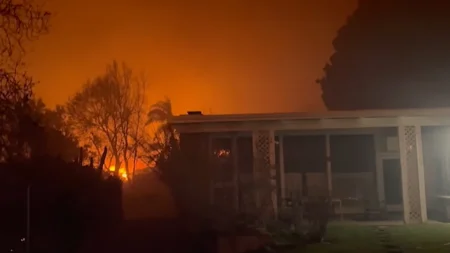The Ongoing Search for Travis Decker: A Father’s Unthinkable Crime
In a dedicated effort spanning two days, the FBI embarked on a challenging search through Washington state’s difficult terrain, hoping to uncover any leads regarding Travis Decker’s whereabouts. Nearly three months have passed since Decker allegedly committed an unimaginable crime—taking the lives of his three young daughters. During a Monday press conference, Chelan County Sheriff Mike Morrison and FBI Supervisory Senior Resident Agent Peter Orth admitted investigators still lack conclusive evidence about whether Decker remains alive. “You can’t be too thorough in a search like this,” Orth explained, highlighting the challenge of the environment. “It is such incredibly dense vegetation that anybody who walks down one of these trails could walk 10 meters off the trail and no one would ever know they’re there.” This natural camouflage presents a significant challenge for search teams, especially considering Decker’s background as a trained military survivalist.
The tragedy began on June 2, when authorities discovered the bodies of Decker’s three daughters—9-year-old Paityn, 8-year-old Evelyn, and 5-year-old Olivia—at Rock Island Campground in the Okanogan-Wenatchee National Forest. The circumstances surrounding their deaths were horrific: a deputy found the children inside a truck with their hands bound and plastic bags over their heads. This discovery came three days after their mother reported them missing when Decker failed to return them from a court-mandated custody visit. The details paint a picture of a premeditated act that has shocked the community and galvanized law enforcement’s determination to find Decker. “We will not relent. We will not give up,” Sheriff Morrison asserted during the press conference, adding a poignant note that “the girls would not want us to give up.” His words reflect both the professional commitment and emotional investment officers have in bringing this case to resolution.
The search operation has been extensive and meticulous, involving approximately 100 FBI agents and other law enforcement officers. To facilitate their efforts, authorities closed popular campgrounds and trailheads in the forest near Leavenworth. Teams have been bushwhacking through rugged terrain, while divers planned to search Icicle Creek, particularly in areas where logjams had previously prevented access. Other investigators conducted a systematic grid search in a quarter-mile radius around the campground where the girls’ bodies were found. Sheriff Morrison offered his assessment of Decker’s potential situation if he’s still surviving in the wilderness: “He’s got to be pretty tired by now. He’s got to be perfect every single day; we just have to be perfect once.” This statement underscores the psychological aspect of the manhunt—a battle of endurance where law enforcement holds a significant advantage through their resources and determination.
Last week brought an important development in the case when authorities confirmed Decker as the sole suspect in the alleged murders. Forensic evidence strengthened this conclusion when investigators found Decker’s DNA at the crime scene, with no additional DNA profiles detected. This evidence eliminates theories about potential accomplices and focuses the investigation squarely on finding Decker. The confirmation reinforces what many had already suspected but provides scientific backing to the case being built against him. Sheriff Morrison expressed unwavering commitment to the search, stating, “If it’s not me wearing this uniform, it’ll be another Chelan County Sheriff… We will find him, in one fashion or another.” His words convey an institutional resolve that transcends any single person—a promise that justice will eventually be served, regardless of how long it takes.
The hunt for Decker represents one of those rare cases where law enforcement faces not only the challenge of apprehending a suspect but also the possibility that the suspect might have taken his own life or succumbed to the elements. The uncertainty about Decker’s status—whether he’s alive and actively evading capture or deceased in a remote location—complicates the search strategy. Teams must simultaneously look for signs of ongoing survival and evidence of death, all while covering vast areas of wilderness. For the investigators involved, this creates both physical and emotional challenges. The physical demands of searching difficult terrain are matched by the emotional weight of seeking justice for three young lives cut tragically short. Meanwhile, the U.S. Marshals Service has offered a reward of up to $20,000 for information leading to Decker’s capture, hoping that financial incentive might encourage someone with knowledge to come forward.
As the search continues, the case serves as a stark reminder of how quickly lives can be shattered by violence. The three young girls—Paityn, Evelyn, and Olivia—will never grow up to fulfill their potential or experience the joys of life that should have been ahead of them. Their mother faces the unbearable grief of losing her children under the most horrific circumstances imaginable. The community around Rock Island Campground has lost its sense of security, with the natural beauty of the area now overshadowed by the memory of tragedy. Law enforcement officials carry the burden of seeking justice while knowing they cannot restore what was lost. Yet, amid this darkness, the dedication of those searching for Decker offers a glimmer of hope—a promise that no matter how long it takes, those responsible for acts of violence will be held accountable. As Sheriff Morrison put it, with determination that transcends the immediate moment: “We will find him, in one fashion or another.”












